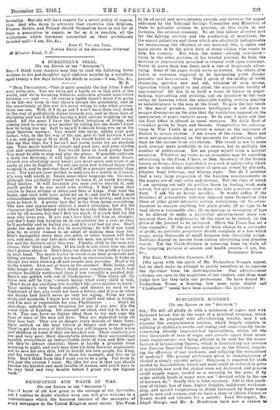NEWSPAPERS AND WASTE IN WAR. (To THE EDITOR OF THE
" SPECTATOR.") SIR,—I know of old how great is the courage of the Spectator, Yet I confess to, doubt whether even you will give welcome to remonstrance which the business instinct of the managers of every newspaper in the United Kingdom must resent. The Press in its editorial and news columns records and enforces the appeal addressed by the National Savings Committee and Ministers of State to patriotic citizens to practise, at this crisis in our fortunes, the severest economy. To set free labour of every sort for the fighting services and the production of munitions, for the export industries and those which are absolutely indispensable for maintaining the efficiency of our national life, is again and again shown to be the plain duty of every citizen who wants to help his country. But when the reader—already convinced— turns to the other portions of his trusted journal, he finds the doctrine so impressively preached is treated with open contempt. Never in peace days was there such a riot of large-scale adver- tising. Some of the pages would serve as posters. On others slim ladies in costumes supposed to be fascinating point slender parasols—not heavenward. Need I speak of the medley of toilet elegancies, specifics new and old, whiskies of rare aroma. cigarettes which appeal to and attest the aristocratic faculty of appreciation? All this is in itself a waste of labour in paper- making, type-setting and printing, and an incentive to the very outlay on luxuries which the admirable leading articles describe as unfaithfulness to the men at the front. To give the last touch to this moral paradox, ordinary intelligence is cut down to meagre dimensions on the plea that the restriction imposed on the importation of paper curtails space. To be just, I must add that the Post Office is abused in equal measure. My daily flood of circulars grows by leaps and bounds. Competition for subscrip- tions to War Funds is as potent a cause as the eagerness of dealers to secure custom. I am aware of the cause. More and more newspapers depend on the payments for advertising rather than on the income from circulation. The result is not to make each journal more profitable to its owners, but to multiply the number of publications. Let me purge myself from a natural suspicion. Whatever my views as an economist may be regarding advertising in the Press, I have, as Hon. Secretary of the Society known as Scapa, always regarded it as a sort of safety-valve which goes far to reduce the defacement of open-air scenes by placards, plaques, huge lettering, and blazing signs. Nor do I question that a very large proportion of the business announcements in the papers are of real value and interest. But the class of which I am speaking not only do positive harm by leading weak souls astray, but give grave offence to those who take a serious view of duty. I ask for no heroic sacrifice. It would suffice it the directors of journalistic industry imposed upon themselves (like those of other great interests) certain restrictions—(1) No adver- tisement to contain anything but plain print; (2) no type to be used above a reasonable size; (3) no spacing or arranging of type to be allowed to make a particular advertisement more con- spicuous than its neighbour's; (4) the rates to be raised; (5) the price of the journal to be increased. (Here the Times has set • wise example.) If the net result of these change be a surrender of profit, no patriotic proprietor should complain of a loss which many, many thousands of small business men cheerfully accept. Railways depend on income from station advertising and pleasure travel. Yet the North-Western is removing from its walls all the tempting pictures of seaside and health resorts.—I am, Sir,
Lc., RICHARDSON E VANS. The Heir, Wimbledon Common, S.W.
[We agree with the spirit of Mr. Richardson Evans's appeal, but we shall make no attempt to justify ourselves or to separate the Spectator from its contemporaries. Our advertisement columns are open to the inspection of our readers, and these must judge how far they belie our professions. To have denied Mr. Richardson Evans a hearing, lost some cynic should caU "Chadbandl would have been cowardice.—En. Spectator.]


































 Previous page
Previous page